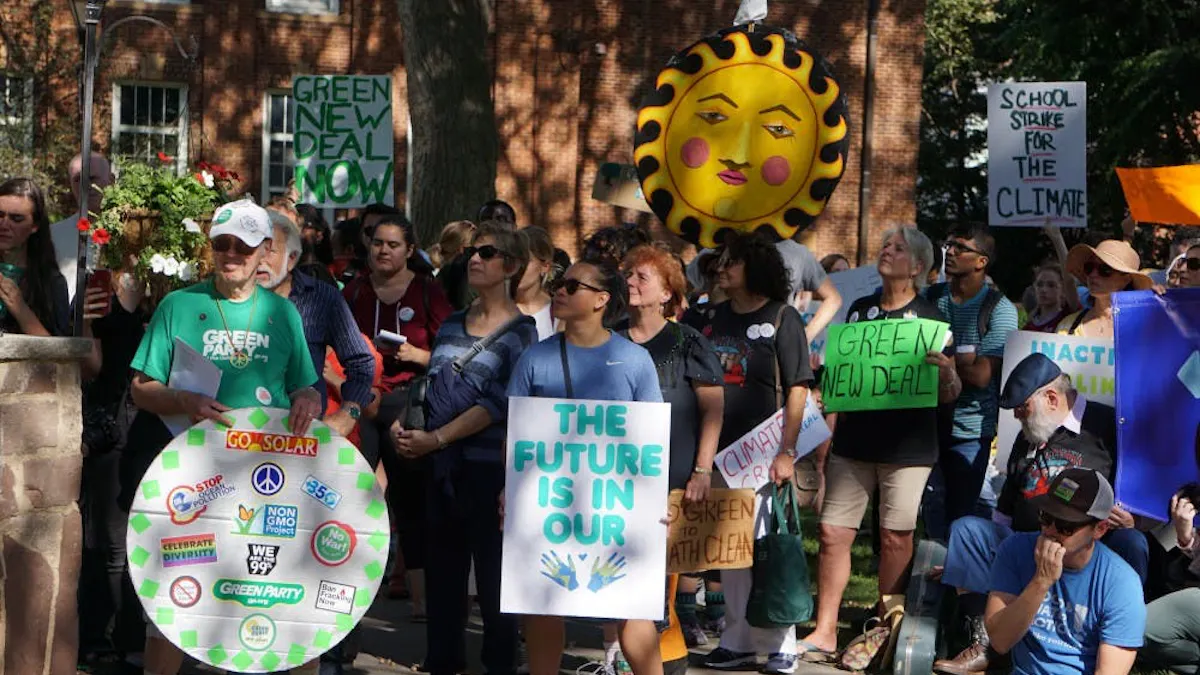Hundreds of protestors involved in the Central Jersey Climate Coalition (CJCC) marched from Voorhees Mall on the College Avenue campus to Rep. Frank Pallone’s (D-N.J.) office on Church Street to, in part, pressure Rutgers to develop an office of sustainability by 2020, divest from fossil fuels by 2024 and implement a plan to become carbon-neutral by 2030.
The coalition of students, faculty and community members held the local climate strike alongside high schoolers and teachers who began their march in Highland Park, culminating in one rally at a closed down section of Church Street. The march was one of thousands of climate strikes across the world, as millions from New York to New Zealand voiced their frustration with society’s lack of urgency in dealing with climate change.
Many members of the Rutgers community who attended the event welcomed the University’s support for taking some action on the climate issue, but also expressed they would like to see tangible results.
“(University) President (Robert L.) Barchi needs to put pen to paper and embrace and sign on to our demands in hope that he’ll transfer our vision for a revolutionary change,” said John Milligan, a School of Arts and Sciences senior. “We do not want empty words congratulating our efforts. We want to see real action.”
Last week, The Daily Targum reported that Barchi “fully supports developing a plan to reach carbon neutrality at Rutgers University by 2030.” Yet, according to an audio recording of Barchi’s address to the University Senate on Friday provided to the Targum by New Brunswick Today, he instead supports the concept of achieving carbon neutrality by 2030, and is looking for a reasonable time frame.
“No, the president does not retract his statement. At the University Senate address, President Barchi reiterated his intention to appoint a faculty task force to examine the issue,” said a University spokesperson to the Targum on Sunday. Members of the committee will be announced this week, according to a University statement provided to the Targum.
Rutgers considers making sustainable choices in purchasing and operations as a priority, according to a University statement provided to the Targum on Friday. The statement also noted that all new construction at Rutgers is built to LEED standards. Rutgers’ 3,400 solar panels on Livingston campus are capable of providing energy to the entire campus.
“President Barchi looks forward to the active participation of the University’s climate change experts in formulating a plan that contributes to the extensive, ongoing work on sustainability already happening across the University,” according to the statement.
Protestors, holding up signs that stated sentiments like “There is no Planet B” and chanting messages such as “No more coal, no more oil, keep the carbon in the soil,” asserted that climate change is a climate crisis, and that action to rid the world of fossil fuels could not wait.
“I think the awareness is already there but its that we need to take action immediately because it is a crisis. I think more people have to be cognizant of the severity of this problem,” said Stephanie Garcia, a Mason Gross School of the Arts sophomore.
Ahan Sikri, a School of Arts and Sciences senior and CJCC organizer, said this event is important because there cannot be work at the international level without local support.
Sikri also expressed dissatisfaction with the University’s investments in fossil fuels as part of its endowment, which the Targum reported earlier this month to be approximately 8 to 10% of total investments.
“So that’s a $1.3 billion investment formed in total and they are making profit and money off are … and they are using it to destroy the planet while Barchi makes $800,000 a year-plus and he lives very comfortably while we, workers, students, faculty, all of us are victims of this climate crisis,” Sikri said.
The University said they would consider divesting in fossil fuels and implementing broader environmental, social and governance (ESG) investment guidelines, the Targum reported at the time.
Amy Wang, a School of Environmental and Biological Sciences senior, said that other universities are leading the charge and Rutgers needs to be trying to even be average. Rutgers is the only Big Ten school that does not have an office of sustainability, she said.
“This is just the beginning. This is the first action we are taking and it is right in the beginning of the semester. If they don’t meet our demands we will escalate and we will continue. This is a long-running campaign and we are willing to fight longer than they are willing to,” Sikri said.
This article was originally published by The Daily Targum.












